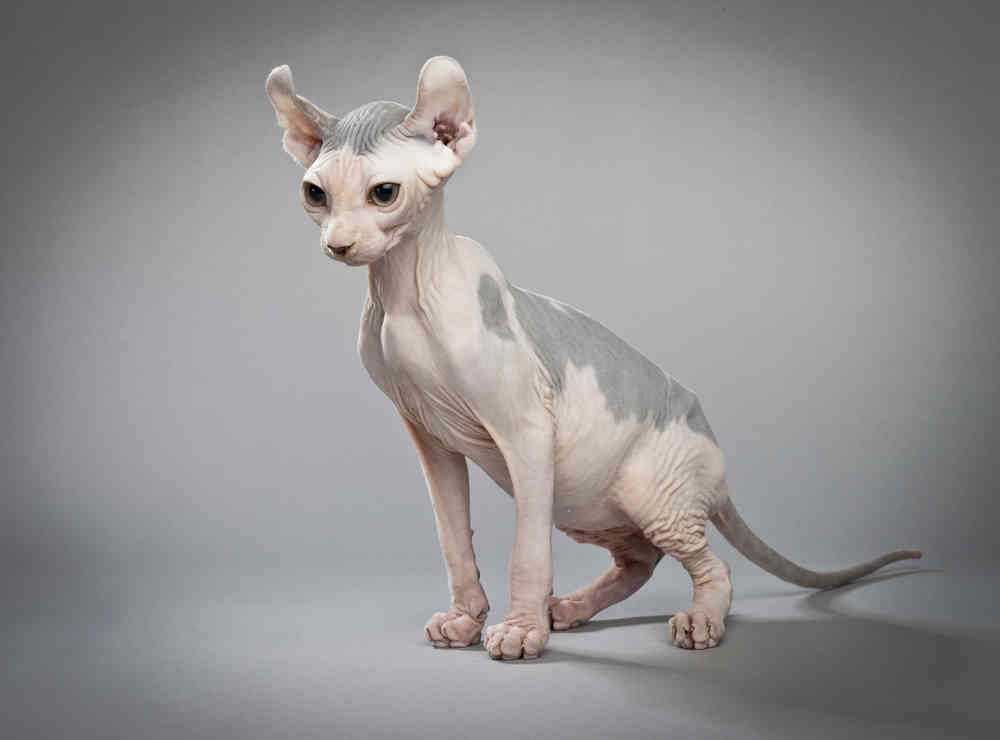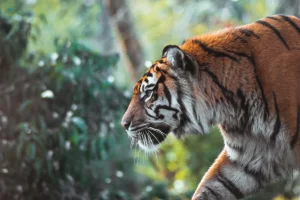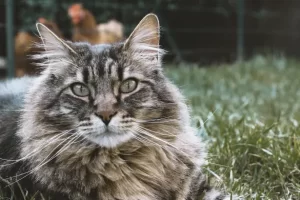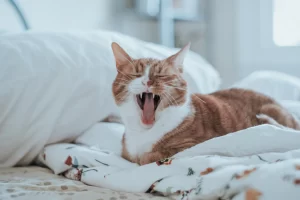Last updated on January 27th, 2023 at 04:21 am

The Elf Cat is a unique and intriguing cat breed characterized by its distinctive curled ears, large eyes, and soft, hairless body. Originally developed in the United States as a hybrid between the American Curl and Sphynx breeds, this breed has quickly become popular among cat owners.
Understanding the unique characteristics of the Elf Cat breed is essential for potential owners who want to provide a loving and caring home to one of these cats. Fortunately, a wealth of information is available about the Elf Cat’s history, traits, grooming needs, diet, and more.
Knowledge is power; whether you are after quenching your curiosity or want to get a Elf Cat into your home, this article will provide you with the facts to know about Elf.
Let’s dive in!
10 Facts to Know Elf Cat Breed
1. History
The Elf Cat is a relatively new breed, developed in the United States by crossing American Curls and Sphynx cats. This hybrid was first accepted as a separate breed in 2006 by the International Cat Association (TICA). However, the Cat Fanciers’ Association (CFA) has not yet recognized the breed.
Moreover, after the development in 2004, the breeders used the outcrossing method to create a variety of Elf Cats with different textures and colors. Karen Nelson and Kristen Leedom, who are Elf founder breeders, initially wanted to create a breed that would combine the playful and social nature of the American Curl with the loving and affectionate personality of the Sphynx.
Something else to note regarding the history of Elf Cats is that the breed was developed in response to the need for hypoallergenic cats.
2. Appearance
Elf’s have various notable sections that make them easily identifiable, from the neck, head, ear, skin, etc.
One of the most prominent features is skin or coat: elf cat has a completely hairless body with smooth, soft skin. This makes them very easy to groom and maintain, as they don’t require brushing.
Ears: Their ears are also notable; they are characteristically curled backward like the American Curl breed, often caused by a genetic mutation.
Head: The head of an Elf Cat breed is a medium-sized wedge with prominent cheekbones, while the muzzle is slightly rounded. What’s more? They have a muscular body, neck, long legs, and short tails.
3. Traits & Temperament
The Elf Cat is an affectionate, outgoing and playful breed. They love to interact with people and be part of the family — making them an excellent choice for households with children or other pets.
The Elf Cat is also knowledgeable and loves to explore its surroundings. This breed can quickly learn tricks and enjoy playing fetch games.
These cats are a curious breed who often try to figure out how things work.
4. Grooming Needs
The absence of fur makes grooming an easy task. All you have to do is give your Elf Cat a weekly rubdown with a damp cloth, and that’s it. You should also keep the eyes and ears clean and apply sunscreen during sunny days since they are more prone to sunburns than furred cats.
Moreover, since the Elf Cat doesn’t have fur, they may require more frequent baths than other breeds. In most cases, owners should give them a bath regularly at least once a week due to their hairless bodies. Bathing with shampoo or other cat soaps recommended by the vet will help to keep their skin clean and free from dirt.
5. Diet Requirements
The proper diet is vital to any cat, and the Elf Cat is no exception. Since they are a new breed, there’s still not much information available on their specific dietary needs — but cats should generally have a balanced diet that combines proteins, carbohydrates, and other nutrients.
Experts recommend feeding your Elf Cat high-quality wet food and providing them access to kibble and treats. Further, note that these cats may require more frequent meals than other breeds due to their small size.
6. Health Issues
The Elf Cat is generally a healthy breed, but like all cats, they are prone to specific health problems. One common problem in this breed is hypertrophic cardiomyopathy (HCM), cats’ most common form of heart disease.
Regular trips to the vet are essential to maintain their health. Additionally, the Elf Cat is known to have an increased risk of dental problems and periodontal diseases, which means extra attention needs to be paid during brushing sessions.
Since, Elf cat breed lack fur, they are more susceptible to extreme temperatures. Like elf’s ancestors, Sphynx, have high chances of getting skin infections; anything oily can cause their skin to develop rashes.
In extreme situations, these cats can suffer sunburns and, at worst, skin cancer. Therefore, keeping your Elf Cat indoors and away from extreme weather conditions is essential.
7. Size & Activity Level
The Elf Cat is considered a small-sized breed, with adults growing to be up to 3.5 to 7kg pounds. They’re a very active breed and love to explore their surroundings. Regarding height and length sizes, they usually measure up to 25-35 cm in length and 15-25 cm in height.
While they are relatively inactive indoors, they still need some playtime and exercise — so ensure they have plenty of toys and opportunities to explore their environment. Providing your cat with a scratching post is recommended
8. Lifespan
With proper nutrition and regular visits to the vet, your Elf Cat can live up to 10-13 years. Research shows that the average lifespan of this breed is a bit higher than their Sphynx ancestors. They generally have a life expectancy similar to other cats, so you can expect your furry friend to be part of your family for many years to come!
9. Mating & Gestation
According to Dr Krista Williams, BSc, DVM, CCRP; Ernest Ward, DVM, they actively mate and have a gestation period of between 60-can give birth as early as 5 months of age, so owners should be prepared for early pregnancy and plan accordingly.
Also, if you are considering breeding them, ensure that the parents don’t carry any genetic diseases that may be passed on to the kittens
10. Training
Like other cats, the Elf Cat is generally an independent breed, but they can still be trained. As with all cats, patience and consistency are key when preparing your furry friend. With the right approach, you should have no problem teaching them basic commands and tricks. Additionally, provide plenty of toys and scratching posts to keep your cat entertained and distracted.
How Much Does A Elf Cat Cost? (UK, US, Canada,…etc)
The cost of an Elf Cat varies widely depending on where you live.
Cost in the US: On average, an Elf Cat will cost between $800 and $1200. This price tag can go up depending on the qualities you are looking for in your pet, such as coat color or unique markings.
Cost in the UK: In the United Kingdom, prices for Elf Cats range from £400 to £1000. Moreover, if you purchase a kitten, this price can be higher.
Cost in Canada: In Canada, prices for Elf Cats start at around $1000 and can go up to $1500 depending on the cat’s quality.
No matter where you live, factor in additional costs such as vaccinations, regular vet checkups, and supplies. Caring for a cat can add up quickly, so be prepared for potential expenses. Do your research before purchasing to ensure you know what is involved with caring for one of these cats.
FAQs
1. Is an Elf Cat right for me?
An Elf Cat may be a great addition to your family if you are looking for a loving companion and don’t mind frequent grooming. They are generally low-maintenance cats that love attention and enjoy spending time with their owners.
2. Are Elf Cats hypoallergenic?
Unfortunately, no cat is entirely hypoallergenic due to the proteins in their saliva and dander. That said, these cats are considered less allergenic than other cats, which may cause fewer allergic reactions in humans.
3. Is an Elf Cat expensive?
The cost of an Elf Cat varies widely depending on where you live and what qualities you are looking for in your pet. Generally speaking, prices can range from $800 to $1500, though additional costs such as vet visits and supplies must also be considered.
Conclusion
Now that you know some facts about Elf cat breed, you can determine if this breed is right for you. With their unique appearance and friendly personality, the Elf Cat makes an excellent pet for those looking for a loving companion. Just remember to do your research before committing to any animal and ensure that you are prepared for all the responsibilities involved in owning a cat.
An Elf Cat can bring years of happiness and joy to your home with proper care and attention. Also, do your research first and find a reputable breeder.


